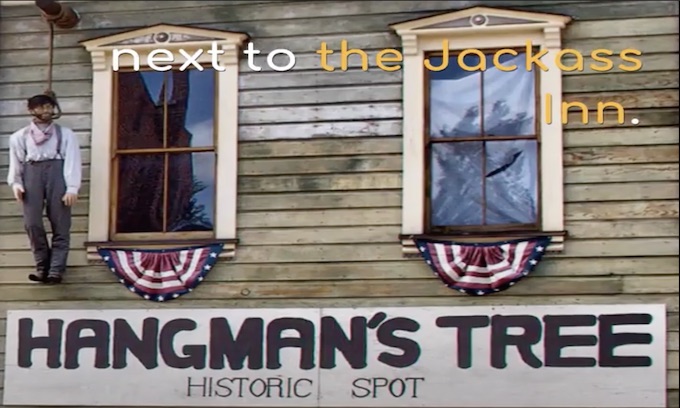A dummy hanging from a noose in front of the Hangman’s Tree Saloon in Placerville is up again, after he was taken down at the beginning of the month. He isn’t coming down anytime soon, according to Sue Taylor, the owner of the building.
The dummy, which many residents of Placerville have historically known as “George,” was taken down after the first weekend of police brutality protests that swept the country.
“There was a lot of threats thrown around,” Taylor said. “We felt more comfortable bringing him in.”
But she wasn’t planning on removing the dummy for good. He was taken down for a routine cleaning, she said. As soon as his shirt was dyed and he was tidied up, she put him back.
Placerville has long come under pressure for its nickname “Old Hangtown,” and the depiction of a hanged man on Main Street. In the wake of the killing of George Floyd, as protesters bring light to the everyday signs of racial injustice throughout the country, the historical imagery of the town is up for debate again.
Advocates for changing the nickname of the town and removing the hanging imagery say that it evokes racial violence.
“The name ‘Hangtown’ is threatening, outdated, and offensive, and suggests that racial hate crimes are acceptable,” wrote Camille Lloyd, who started a petition that urges Placerville to remove the nickname from their welcome sign. The nickname also could be upsetting for people, especially those who have been victims of hate crimes, says the petition, which has more than 5,000 signatures.
Lynchings have long been associated with the symbol of the noose. The Bowtie Barbershop in Placerville was criticized for using the imagery of a hanging in 2018 when the owner hung a Colin Kaepernick doll from his ceiling.
There are many accounts of Mexican men being lynched in California during the Gold Rush era. In one case, in 1877, about 100 Anglo men broke into a jail, took five men of Mexican descent out onto the courthouse lawn, and hanged them, according to the New York Times.
Another petition, created a few days after Lloyd’s, urges the Placerville city council to keep the nickname “Old Hangtown.”
Sean Yeske, the creator of the petition, writes that the nickname didn’t come from “racially charged hangings,” but from the hangings of three outlaws who rode through the town firing their guns, when Placerville was a Gold Rush town. Yeske’s petition has more than 13,000 signatures.
According to the Placerville Downtown Association website, the nickname comes from hangings that took place in Placerville at the height of the Gold Rush, when the city was a gold camp known as “Dry Diggins.”
Robberies and murders were prevalent, and citizens often took it upon themselves to hold trials and punish those suspected of crimes. The nickname “Hangtown” came from an incident in which several men were hung from an oak tree, according to the “Visit El Dorado” website.
“We wish to preserve our history, ‘warts and all’ for all proceeding generations,” Yeske wrote.
The dummy hangs at the site where the oak tree once stood, according to the Hangman’s Tree website. The site has housed a saloon since 1895, which was converted into an ice cream parlor by Sue Taylor and her family in 2017.
The site is designated as California Historical Landmark #141.
Debate over heritage, historical context
Taylor, the owner of the Hangman’s Tree Saloon, said there are many people who are not offended by the dummy. “For a lot of people, George is a symbol of law, order, and justice, and they don’t want to see that taken away,” she said.
“We are a small community that needs to heal. People coming to our town and forcing the stripping down of our historical context is not going to bring that peace, only eternal resentment,” Taylor wrote in a text.
Though many people see place names and monuments as part of historical preservation, that’s not always the case, said Anne Lindsay, the director of the Public History program at Sacramento State. Place names and statues usually don’t have the context that makes for historical accuracy.
“That’s not history, that’s heritage. And there’s a difference,” Lindsay said.
Heritage is a combination of history, tradition and culture, which comes together to form a set of ideas that is passed down through generations. It often lacks the accuracy and context that history has, said Lindsay.
Kelley Rogers, the owner of the Hangtown Skate Shop, has struggled with the lack of context behind the moniker “Old Hangtown,” especially when he advertises his brand out of town. At a trade show in Colorado, a customer asked him for a sticker, but when he handed it to her, she immediately refused.
“I just thought, wow, that meant something to her. It triggered something negative for her,” Rogers said.
Rogers said that the history behind “Old Hangtown” has been with him his entire life. But now, he thinks it’s time for a change.
Everyone says that preserving the name is about learning from history, Rogers said. But he doesn’t think the lessons are worthwhile, now. “What am I learning? What are we learning?” Rogers asked. “Using this symbol, it doesn’t really make me feel good anymore.”
In light of recent events, Rogers plans on changing the name of his skate shop to something unrelated to hangings, but that represents the beauty of the area more fully.
___
(c)2020 The Sacramento Bee (Sacramento, Calif.)
Visit The Sacramento Bee (Sacramento, Calif.) at www.sacbee.com
Distributed by Tribune Content Agency, LLC.
—-
This content is published through a licensing agreement with Acquire Media using its NewsEdge technology.



















Recent Comments